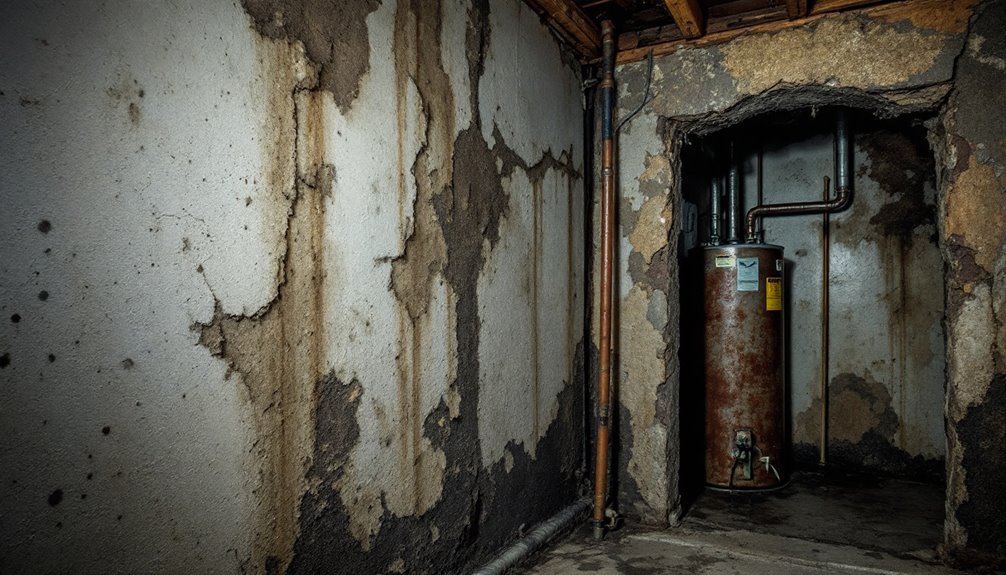Hidden legal issues can quickly derail a home purchase and lead to costly consequences. State disclosure laws vary widely, with some requiring extensive reporting of defects while others mandate minimal transparency. Real estate agents may conceal critical information about property conditions, and undisclosed problems often surface after closing. Buyers face risks from intentional misrepresentation, fraudulent concealment, and inspection gaps. Understanding these potential pitfalls and legal options helps protect homebuyers’ interests in this complex process. Homebuyers should also be vigilant about reviewing all documentation and conducting thorough inspections to mitigate risks. Additionally, many buyers overlook the importance of consulting legal professionals, which can help prevent top legal mistakes by business owners that may also apply to individual transactions. By being proactive and informed, homebuyers can navigate these hidden challenges and safeguard their investments in a competitive market.
Key Takeaways
- Undisclosed property defects can lead to expensive repairs and legal battles when sellers intentionally hide known issues from buyers.
- Failure by sellers or agents to disclose material facts about the property violates state laws and constitutes fraudulent misrepresentation.
- Death-related incidents on the property may require disclosure in some states, potentially affecting property value and buyer decisions.
- Hidden liens, easements, or property restrictions can severely limit property use and trigger unexpected legal complications.
- Real estate agents concealing critical information face legal liability, potentially invalidating the sale and causing financial losses.
Undisclosed Property Defects: What You Need to Know

Undisclosed property defects represent one of the most serious legal issues in real estate transactions. Sellers have a legal obligation to reveal all known defects, regardless of their severity. Even when selling a house “as is,” this duty remains unchanged. Failure to disclose can trigger property disputes and costly lawsuits. Additionally, undisclosed defects can lead to substantial financial repercussions for sellers who may face litigation from unsuspecting buyers. In some cases, bizarre property disputes revealed in court have stemmed from seemingly minor oversights, underscoring the importance of thorough inspections and transparent communication. To protect themselves, both parties are encouraged to conduct detailed assessments and seek legal advice to ensure a smooth transaction free from hidden issues.
Buyers have legal rights when defects are discovered after purchase. Evidence that sellers knew about problems but concealed them can support claims for damages. Hidden issues like painted-over damage often indicate intentional concealment. Real estate agents also share responsibility, as they must disclose material facts they know about. Home inspectors can be held liable for missing significant problems that professionals should identify. Documentation from neighbors, contractors, or previous repair work strengthens cases of nondisclosure in court.
The Truth About State Disclosure Laws and Your Rights
Every state has unique real estate disclosure laws that directly impact buyers' and sellers' rights. For instance, Texas requires disclosure of deaths related to property conditions but not natural causes, while Georgia only mandates disclosure of homicides when directly asked.
Disclosure laws vary substantially in real estate transactions across states. Minnesota requires sellers to reveal all "material facts" affecting property enjoyment, including underground storage tanks and radon levels. Illinois mandates a formal disclosure report for known material defects.
Non-compliance with disclosure laws can lead to serious consequences. Sellers who hide information face potential lawsuits, criminal charges, and financial penalties. Even "as is" sales don't exempt sellers from disclosure requirements. To guarantee compliance and protect their interests, both buyers and sellers should consult real estate attorneys familiar with local disclosure laws.
When Real Estate Agents Hide Critical Information

Concealing critical information by real estate agents creates serious legal and financial risks for homebuyers. Real estate agents may engage in intentional misrepresentation by providing false details about property conditions or value. The concealment of material facts, like known defects or legal issues, can profoundly impact a buyer's decision-making process.
- Hidden structural problems that could cost thousands in repairs
- Undisclosed environmental hazards or contamination issues
- Concealed zoning restrictions affecting property use
- Unreported liens or legal disputes tied to the property
When agents deliberately withhold essential information, buyers often discover these issues after closing, leading to expensive legal battles and property devaluation. State laws require agents to disclose material facts, making such concealment not only unethical but potentially illegal. Buyers should protect themselves by conducting thorough due diligence and working with reputable professionals.
Home Inspection Gaps That Can Cost You Thousands
A thorough home inspection can still miss critical issues that lead to expensive repairs and safety hazards. Structural defects in foundations can cost up to $30,000 to fix, while faulty electrical systems pose serious safety risks. Even with a home inspection, problems like asbestos contamination might remain hidden until after purchase.
System deficiencies often surface after moving in, with HVAC replacements reaching $10,000 and new roofs exceeding similar costs. Chimney repairs can range from $250 to $30,000, while septic issues might demand up to $20,000 in repairs. Getting legal advice before purchase helps protect buyers from these unexpected expenses.
Hidden safety hazards like inadequate ventilation or damaged asbestos require immediate attention, with cleanup costs ranging from $500 to $10,000. Smart buyers combine professional inspections with legal guidance to minimize these risks.
Legal Options for Recovering Your Losses After a Bad Deal

When a real estate deal goes wrong, buyers have several legal paths to recover their losses. Courts can award compensatory damages to cover costs from hidden defects, including repairs, property value reduction, and related expenses like storage or bridge loans. In cases where sellers acted maliciously, punitive damages may be awarded to discourage future fraudulent behavior.
- File a breach of contract lawsuit to recover damages and earnest money deposits
- Seek compensatory damages for out-of-pocket costs and property value loss
- Request rescission to cancel the deal and recover funds in cases of serious fraud
- Pursue specific performance to force completion of the sale
The court's decision depends on factors like contract terms, proof of damages, and evidence of bad faith. Liquidated damages clauses can specify compensation amounts, while relief from forfeiture may protect buyers from unfair deposit losses.
Frequently Asked Questions
Can a Buyer's Real Estate Agent Be Held Liable for Undisclosed Defects?
Yes, a buyer's real estate agent can be held liable for undisclosed defects. Agents have a legal duty to exercise reasonable care and disclose material defects they know about or should have discovered. If they fail to meet this obligation, they may face civil lawsuits, professional discipline, and monetary damages. Courts can hold agents responsible for negligent misrepresentation, breach of fiduciary duty, or fraud when they fail to disclose known defects.
How Long After Closing Do I Have to File a Lawsuit?
While lawyers gleefully count their billable hours, homeowners must count their days more carefully. The statute of limitations for filing a lawsuit after closing typically runs 4 years for breach of contract or fraud claims. Property damage claims have a 2-year limit. However, the discovery rule may extend these deadlines – the clock starts when someone discovers (or should have discovered) the problem. Smart homeowners document issues promptly and consult attorneys early.
Are Death-Related Events on the Property Required to Be Disclosed?
Death-related disclosures vary by state. In California, sellers must disclose any deaths that occurred on the property within the last three years. Some states only require disclosure for violent deaths or murders. Others have no requirements at all. Even if not legally required, sellers should disclose death-related events if directly asked by buyers. HIV/AIDS-related deaths require disclosure of the death but not the cause.
What Happens if the Seller Declares Bankruptcy During Litigation?
"When it rains, it pours" – especially when a seller declares bankruptcy during litigation. The bankruptcy filing immediately stops all court proceedings through an automatic stay. The bankruptcy trustee takes control of the property and can reject the sale contract. Buyers become unsecured creditors, typically receiving only 30-50% of their claim. Their right to specific performance gets replaced with a monetary claim, which must be filed in bankruptcy court for consideration.
Can Homeowner's Insurance Cover Damages From Undisclosed Pre-Existing Conditions?
Homeowner’s insurance typically does not cover damages from undisclosed pre-existing conditions. These issues are usually excluded from standard policies because they existed before coverage began. However, if the seller deliberately concealed known defects, homeowners may have legal recourse through fraud claims. Some insurers offer special endorsements or riders for pre-existing conditions, but these come with higher premiums. Homeowners should carefully review their policy exclusions and document any discovered issues. It is also important for homeowners to be aware of regional risks, such as earthquakes or man-made activities that could impact their property. For instance, some insurers now offer fracking insurance in California to address potential damages caused by hydraulic fracturing, though this coverage is often limited and comes at a higher cost. Understanding these specialized policies can help homeowners make informed decisions about protecting their investments.
Conclusion
Hidden legal issues lurk beneath the shiny surfaces of dream homes like sharks in murky waters. Smart buyers dig deeper than fresh paint and fancy fixtures, investigating every detail from disclosure laws to inspection reports. While agents showcase gleaming hardwood floors and updated kitchens, savvy purchasers focus on legal protections. Armed with knowledge and professional guidance, homebuyers can navigate these treacherous waters safely, transforming potential disasters into successful investments.
